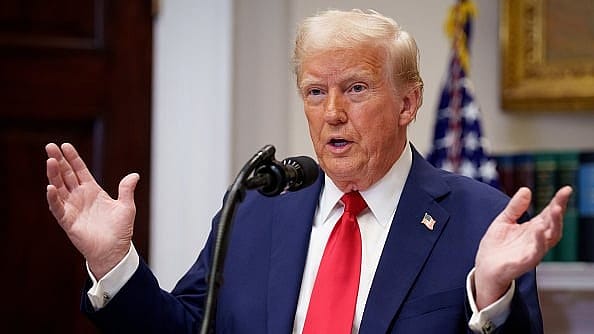Industry disappointed with Trump’s 25% tariff but sees opportunity for India to emerge as manufacturing alternative
ADVERTISEMENT

Amid US President Donald Trump’s announcement to levy a 25% tariff as well as secondary sanctions on exports from India starting from August 1, 2025, India's business associations have expressed disappointment, saying it will have a clear bearing on India's exports, but experts say if the industry steps up with quality, compliance, and competitiveness, it's a clear opportunity for it to reduce exposure to risks and emerge as a cost-effective alternative in manufacturing.
Earlier, Donald Trump said India would pay a tariff of 25% and a "penalty" for indulging in business with Russia. Trump's statement comes as the two countries failed to reach an agreement on bilateral trade, despite five rounds of talks, though talks are still on.
Harsha Vardhan Agarwal, President, FICCI, said FICCI is disappointed by the decision taken by the U.S. to levy a 25% tariff on exports from India and impose secondary sanctions. "While this move is unfortunate and will have a clear bearing on our exports, we hope that this imposition of higher tariffs will be a short-term phenomenon and that a permanent trade deal between the two sides will be finalised soon.”
India and the U.S. have a long-standing partnership, with engagement across an array of areas from technology to defence to energy and advanced manufacturing. The FICCI chief is confident after the detailed deliberations that are currently underway, both countries will see beneficial outcomes.
India has been actively negotiating a BTA with the US since the start of the year. Agarwal says there had been some specific demands from the US side, which are not in India's "national interest", and therefore the Indian government has not given in to those demands from the US. "Also, the US team is coming to India in the latter half of August to further discuss the BTA. We are hopeful that the two sides will make progress in their discussions and complete the negotiations by September-October 2025," he added.
India's chance to emerge as a credible alternative
For India, the US is an important market, both in goods and in services. The government has already said it is studying the overall impact of Trump's statements, and that it's committed to a "fair" trade deal with the US. The commerce & industry ministry has said that for the government, protecting and promoting the welfare of farmers, entrepreneurs, and MSMEs is paramount. However, commerce and industry minister Piyush Goyal had earlier clarified that India would not succumb to deadline "deadlines", hinting at Trump's August 1 deadline.
It is also important to note that India offers a large market for U.S. businesses, and many of the large companies from the U.S. benefit from leveraging the demand as well as the skills and talent pool the country offers.
With today's announcement, the US seems to have made it clear that it plans on imposing higher tariffs across major exporting nations, including India, China, Vietnam, and Bangladesh. In this context, the world could enter a new phase of supply chain realignment, says Hemant Jain, President, PHDCCI. "While Indian MSMEs are momentarily impacted, this is also an opportunity. With global buyers looking to de-risk from overdependence on select geographies, India is emerging as the most credible, democratic, and scalable alternative," he said.
He said India's demographic dividend, technological agility, and entrepreneurial depth set it apart. "With China and Vietnam facing similar tariff headwinds, India stands to gain long-term trust, diversified market share, and stronger positioning as a resilient global partner," he said, urging the industry to view this moment not as a setback, but as a springboard.
Potential industry-specific challenges
Among specific challenges to the industries following Trump's statement today, experts say the imposition of a 25% tariff on Indian exports could create short-term challenges for the electronics and manufacturing sectors, particularly at a time when investment momentum has been strong. "While these tariffs could cause temporary uncertainty for cross-border investors and OEMs evaluating India as an export base, they also underscore the need for India to deepen its competitiveness through lower input tariffs, stronger trade access, and accelerated infrastructure execution," says Kunal Chaudhary, Tax Partner, EY India.
With regards to the IT sector, Nitin Bhatt, technology sector leader at EY India, says there could be substantial ripple effects even though the sector won't be directly hit. Rising input costs may prompt US companies to scale back discretionary tech spending. "Simultaneously, growing unease around workforce mobility and evolving digital taxation frameworks could redefine how cross-border services are priced and delivered."
Rishi Shah, partner and economic advisory services leader, Grant Thornton Bharat, said given the escalating rhetoric around Russia-Ukraine negotiations, some form of adverse development was anticipated; however, the fine print of Trump's announcement today remains crucially important, he said. "The specifics of the additional ‘penalty’ beyond the 25% tariff may determine the actual economic impact," said Shah.